
Nov 18, 2025

The recently presented caffeine substitute market by the Metastat Insight has become a significant talk due to the fact that the number of consumers looking for alternatives to conventional caffeinated drinks is increasing. People are now more aware of how caffeine affects their sleep, mood and overall health, hence the explosion of interest in caffeine-substitute products that can offer a similar experience but with less stimulant. This market, which is health-conscious buyers, professionals avoiding caffeine late in the day, or just those who want a milder caffeine lift, provides new product assortments and new momentum.
Market Context
The traditional caffeine sources are suffering from various challenges. The majority of the people consuming regular coffee or energy drinks report sleep problems, have been experiencing jitteriness or digestive upset. On top of that, the coffee sector is facing supply pressure due to climate-related yield disruptions and rising commodity costs. These pressures are allowing the entrance of products that can mimic the social and sensory experience associated with coffee without the associated caffeine intake.
The caffeine substitute market is right here, stepping in and offering a variety of plant-based, roasted-grain or herbal products that not only eliminate the problem created by excessive caffeine consumption, but also retain the flavour, aroma, and the ritual. By doing this it is in tune with consumers' lives, that are increasingly being oriented to wellness, mindfulness, and moderation.
How It Works / Why It’s Valuable
Chicory root, barley, dandelion, and adaptogenic mushrooms, or herbal extract blends are some ingredients that are used in the products available on the market nowadays to totally remove or at least significantly lower caffeine content. Such alternating mainly cater the needs of consumers for a hot drink, a soothing creamy-like taste, a small amount of energy or a better concentration, and lesser adverse effects. The main difference of the product is the offering of the taste and coffee, tea or mocha-style drinks rituals to the consumers without caffeine being the chief active ingredient.
Some formats do so by delivering prebiotic fibre, antioxidants, or other functional benefits thus the offering becomes more than just “coffee without caffeine.” As the consumers are often looking for natural remedies, these substitutes also facilitate the positioning around clean-label, plant-based and gut-friendly lifestyles.
Growth Story / Technological Evolution
Initially, these substitutes were limited to roasted chicory blends or ancient grain drinks sold only in some parts of Europe or health food stores. Over time, with the awareness of the shift in consumer behaviour by the mainstream brands and new entrants, the competition for innovation increased: varieties of "mushroom coffees" aimed at being classified as adaptogens, powdered instant mixes, single-serve sachets, liquid shots, and even premium café-style blends came into existence.
Not only did the flavour-profiling, aroma retention, and packaging convenience make these alternatives more easily acceptable than before but also helped to elevate them from being marginal. The extent of manufacturing and distribution channels also being a factor the classic way, which of course included e-commerce and direct-to-consumer, led to the audience being broader. The whole market trend indicated a shift from a curiosity or specialty niche to a credible substitute catego
Regional or Global Trends
Adoption is strongest in regions with high health awareness and mature café culture. Europe stands out, led by consumers seeking plant-based, lower-caffeine lifestyles and local brands offering roasted-grain alternatives. In North America, the shift is driven by wellness trends and the rise of specialty beverage brands. Meanwhile, Asia-Pacific is emerging as a region with high growth potential: urbanisation, rising disposable income, and increased awareness of alternative wellness beverages are supporting growth across India, China and Southeast Asia. In these regions, the tradition of herbal and grain-based beverages provides a foundation for substitute products to gain traction.
Challenges and Opportunities
On the challenge side, cost remains a hurdle: some alternative raw materials or processing methods (e.g., adaptogenic mushrooms, specialised extraction) raise production cost and retail price. Regulatory frameworks may lag behind new ingredients or novel formats, creating compliance uncertainty. Competition is intensifying both from traditional caffeinated beverages and from other wellness options (e.g., tea, functional drinks). On the opportunity side, manufacturers can expand into ready-to-drink formats, subscription models or customisable blends. Partnerships with cafés, retailers or wellness platforms create synergies.
The convergence of functional ingredients (prebiotics, adaptogens, mood-support botanicals) with caffeine-free formats opens up innovative applications beyond beverages such as in food, snacks or supplements. Sustainability and ethical sourcing also add value when aligned with consumer preferences.
Why It Matters Now
The caffeine substitute market presented by Metastat Insight connects to broader trends: increasing emphasis on sleep and recovery, reducing dependence on stimulants, and choosing products that align with holistic wellbeing. As digital lifestyles and work-life boundaries blur, consumers are re-examining traditional routines including how and when they consume caffeine.
This market offers an alternative path: the familiar ritual of a warm beverage, without potential downsides. In a world where individual wellbeing and sustainable choices are gaining prominence, this sector is positioned to influence how beverages and functional goods evolve. It matters because it contributes to the next chapter of beverage innovation one that balances enjoyment, health and lifestyle.
Drop us an email at:
Call us on:
+1 214 613 5758
+91 73850 57479